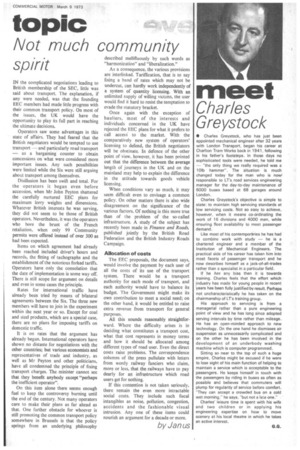topic
Page 57

If you've noticed an error in this article please click here to report it so we can fix it.
Not much community spirit
IN the complicated negotiations leading to British membership of the SEC, little was said about transport. The explanation, if any were needed, was that the founding EEC members had made little progress with their common transport policy. On most of the issues, the UK would have the opportunity to play its full part in reaching the ultimate decisions.
Operators saw some advantages in this state of affairs. They had feared that the British negotiators would be tempted to use transport – and particularly road transport — as a bargaining counter to obtain concessions on what were considered more important issues. Any such possibilities were limited while the Six were still arguing about transport among themselves.
Disillusion has been swift and total. For the operators it began even before accession, when Mr John Peyton shattered the carefully nurtured EEC plans for maximum lorry weights and dimensions.
Whatever British interests he was serving, they did not seem to be those of British operators. Nevertheless, it was the operators who bore the brunt of the French retaliation, when only 99 Community permits were offered instead of over 300 as had been expected.
Items on which agreement had already been reached included driver's hours and records, the fitting of tachographs and the establishment of the notorious forked tariffs. Operators have only the consolation that the date of implementation is some way off. There is still scope for argument on details and even in some cases the principle.
Rates for international traffic have already been tried by means of bilateral agreements between the Six. The three new members will have to join in the experiment within the next year or so. Except for coal and steel products, which are a special case, there are no plans for imposing tariffs on domestic traffic.
It is on rates that the argument has already begun. International operators have shown no distaste for negotiations with the
other countries; but various economists and representatives of trade and industry, as
well as Mr Peyton and other politicians, have all condemned the principle of fixing transport charges. The minister cannot see that they benefit anybody except "perhaps the inefficient operator".
On this item alone there seems enough fuel to keep the controversy burning until the end of the century. Not many operators care to make their plans as far ahead as that. One further obstacle for whoever is still promoting the common transport policy somewhere in Brussels is that the policy springs from an underlying philosophy described mellifluously by such words as "harmonization" and "liberalization."
As a consequence, the various provisions are interlinked. Tariffication, that is to say fixing a band of rates which may not be undercut, can hardly work independently of a system of quantity licensing. With an unlimited supply of willing victims, the user would find it hard to resist the temptation to evade the statutory bracket.
Once again with the exception of hauliers, most of the interests and individuals concerned in the UK have rejected the EEC plans for what it prefers to call access to the market. With the comparatively new system of operators' licensing to defend, the British negotiators will be obstinate. In defence of the other point of view, however, it has been pointed out that the difference between the average length of journeys in the UK and on the mainland may help to explain the difference in the attitude towards goods vehicle licensing.
When conditions vary so much, it may seem difficult even to envisage a common policy. On other matters there is also wide disagreement on the significance of the various factors. Of nothing is this more true than of the problem of the so-called infrastructure. A study of the subject has recently been made in Finance and Roads, published jointly by the British Road Federation and the British Industry Roads Campaign.
Allocation of costs The EEC proposals, the document says, would involve the payment by each user of all the costs of its use of the transport system. There would be a transport authority for each mode of transport, and each authority would have to balance its budget. The Government might make its own contribution to meet a social need; on the other hand, it would be entitled to raise extra revenue from transport for general purposes.
All this sounds reasonably straightforward. Where the difficulty arises is in deciding what constitutes a transport cost, what that cost represents in money terms and how it should be allocated among different types of road user. Even the direct costs raise problems. The correspondence columns of the press pullulate with letters from wordy railway fanciers who claim, more or less, that the railways have to pay dearly for an infrastructure which road users get for nothing.
If this contention is not taken seriously, there remain the even more intractable social costs. They include such fiscal intangibles as noise, pollution, congestion, accidents and the fashionable visual intrusion. Any one of these items could nourish an argument for a decade or more.
by Janus




















































































































































